Dashnor Kaloçi
The first part
Memorie.al publishes an archival document extracted from the Central State Archive (fund of the former Presidium of the People’s Assembly of the People’s Socialist Republic of Albania), which belongs to the date July 16, 1982, where there is a recorded conversation between the President of the Presidium of the People’s Assembly, Haxhi Lleshi, with the well-known historian, Prof. Dr. Kristo Frashëri. As we will see from the document in question, the historian, Frashëri, went to a meeting in the office of the Presidium of the People’s Assembly, at the request of the President, and the entire conversation between them focused on the rewriting of history, mainly that of the district of Dibra, where Haxhiu was originally from and where he had all his activities, since the time of the Zog Monarchy and the period of the country’s occupation, 1939 – 1944. He asks the historian Frashëri, when he rewrites the history of the War of the province of Dibra, to be very careful and to implement his orders.
Archive document with process – the minutes of the conversation between the President of the Presidium of the People’s Assembly, Haxhi Lleshi, with the historian, Kristo Frashëri
NOTES FROM THE CONVERSATION OF FRIEND HAJJI LLESHI
WITH HISTORIAN KRISTO FRASHĖRI
(on 16.7.1982)
Mr. Haxhi Leshi: Come on, friend Kristo, order.
Mr. Kristo Frashëri: Hello, dear President, how is you?
Mr. Haxhi Lleshi: I called you, but I didn’t find you. I enjoyed your writing. You are a good historian. For historians, we need such.
Mr. Kristo Frashëri: I was sick for three months, so…
Mr. Haxhi Lleshi: You’re fine now, aren’t you? I am glad you are okay. How old are you Kristo?
Mr. Kristo Frashëri: I am 63, friend President, but the years fly by.
Mr. Haxhi Lleshi: One day I heard an old woman who was 80 years old and told me: if I were 70, I would be very young. So, we are relatively young. We will work as long as we are with the Party and with Enver Hoxha. How nice of you to come. I talked with some friends about the history of Dibra.
I told my friend Haki Toska: We had Kristo in Dibër during the War and he knows that area well. We care that he can do this job well. I also told Ramiz Ali. I also talked with Ndreçi Plasari and Jovan Bardhi. I don’t mean that my name comes up, but about the War.
Mr. Kristo Frashëri: Now the time has come, I asked the Institute to release me. A few days ago, I went to my friend Alex.
Mr. Haxhi Lleshi: Now this work must be done, it is a duty, but it also needs passion. If we didn’t do it for Big Dibra, who will? Why, the Yugoslavs will do it?! They had made a film about Ibe Palikuqi, as if she had loved and not fought! But, when we did a show, fearing that the truth would come out, they made a lot of noise on our television, so that they wouldn’t watch it there.
Mr. Kristo Frashëri: I spent a month at Ibe Palikuqi’s house. I had her as a sister, and she washed my shirts. How good Ibja was.
Mr. Haxhi Lleshi: Yes, for this show they put loudspeakers so that it could not be watched there. They all deny the entire activity of the 18th Brigade. We fought there. The Macedonians, only 50 people, barely made it. And we were a whole brigade.
When Miladin came, I told him: take Miladin, this is how the Macedonians are, they gave us their word and did not come to Sofroçan. They say it themselves, the people, you have liberated us, they say. So you will do a great job.
Mr. Kristo Frashëri: I think I will do the job properly; I will work in my spare time.
Mr. Haxhi Lleshi: You will do a very useful and good job.
Mr. Kristo Frashëri: These friends, like friend Sul and others, should bring the materials they have. From September I think that I will start systematically. I believe they will make it easier for me at work.
Mr. Haxhi Lleshi: Did you see a novel by Skender Jasa? It seemed good to me, what did you think?
Mr. Kristo Frashëri: It lacks a literary axis, but it has material. Skenderi accepts my remarks and is now working to implement them.
Mr. Haxhi Lleshi: It is your duty to warn him. There is material to make history.
Mr. Kristo Frashëri: In the beginning there were only memories, but documents are also needed. Now there is.
Mr. Haxhi Lleshi: Time works. Here, for example for the League of Prizren, a very good job was done for its 100th anniversary.
Mr. Kristo Frashëri: Now I think there is satisfactory material. There will be others in the works.
Mr. Haxhi Lleshi: Comrade Enver also made it clear now. Many lies, servility, subjectivism will be removed. Mehmet Shehu drove out the reactionary people, as if he alone had fought.
And for Tirana, that’s how he wanted to go out, that he and no one else had liberated it. He had also received the merits of others. And in the Tirana war, it was Hysni Kapo and Gogo Nushi, who made it a palm and a barricade. But why, only one Mehmet Shehu fought the war?!
I saw Ndreçi Plasar in a show and he took out Okshtun and Skrapar, as if they were reactionaries! Mehmet Shehu says: I received a letter from Haxhi Lleshi. Yes, it was an order from the General Staff and not a letter as the enemy will present it.
In 1939, I told Ahmet Cami: don’t give up!
– The Yugoslav and Greek officers surrendered, but not us, – he told me. And they surrendered together with the others. And in 1943, that’s how he surrendered. Plunder and some Gollobordas. He never put the partisan star either. Bile surrendered with a gun in hand. We should not do this hero. My brother was also killed when he was going to deliver a letter that I gave him.
Even I went to his funeral. I had Ejup Cami as a translator for 2-3 hours and he was killed. He became a martyr. They made different articles for him, as far as I can tell. And even in August 1943, he was with Italy, when we liberated Zerqani. Those Camaj ended up war criminals. But we don’t want to open these notebooks. Therefore of these, guard.
Mr. Kristo Frashëri: I am a historian and I will tell you, as history says. I will be protected, but you also protect me.
Mr. Haxhi Lleshi: Let’s look at the positive side of our War and heroes. So, for example, Elez Isufi fought against the Turks, against the Montenegrins, against the Serbs, let’s name it.
Mr. Kristo Frashëri: He is a big figure. Dibra has four heroes of the National Liberation War, but there is none ahead! Why? There are prominent Dibra figures from before.
Mr. Haxhi Lleshi: He fought all his life, in 1922, in 1924 and continuously. In Dibër, there was great resistance against Zog’s regime. He entered as far as Tirana. Bajram Curri came all the way to Kruja, while Halit Lleshi came from Elbasan. And Elez Isufi closed it with honor.
Mr. Kristo Frashëri: He is an outstanding figure.
Mr. Haxhi Lleshi: My tribe has its whole life in centuries, patriotic traditions. 4-5 generations in the time of Turkey. Halit Lleshi, since 1912-1913, has waged a war for freedom and independence of the country. There is also that song:
“Hajredin Pasha head-steel,
It’s not Dibra Thessaloniki…”!
This is how we fought against the Serbs. We were burned by the Serbs; one of our grandfathers was with Ali Pasha Tepelena. Halit Lleshi participated and organized the uprising in 1922. The war of ’22 was a prelude to 1924.
Who joined the Party? Dibra played the leading role, but other provinces also struggled. Fadil Hoxha, Mahmud Bakalli, Veli Deva and others came in 1942-1943 to Kosovo, while Enver Hoxha had already organized the war there.
Comrade Enver met Baba in 1939. I had told Baba: start, when the war had not yet started, I have first. Then the Party was formed. I was friends with Baba there for 9 years, since 1939. I have been a revolutionary friend with him for 52 years.
Therefore, with the people, with the masses, let the truth come out as it is. I liked that song about Idriz Seferi, its author studied documents before. So, let’s rely on the documents. Sula is the chairman of the commission.
Mr. Kristo Frashëri: I want that too, relying on documents.
Mr. Haxhi Lleshi: Have you done anything so far?
Mr. Kristo Frashëri: No, I will start now from September. Chapters – chapters, I will.
Mr. Haxhi Lleshi: Dibra was the first in the North. This is not just about me, because I, along with all my friends, walked the right path of Enver Hoxha. I have been with the Communists even before, without being in the Party. I wait and escort Shaqir and Hysni Dema to my house. I had no personal enmity. I have encountered Tempo. I was flattered and on the other hand, Enver wrote differently to Hoxha.
– No, I told him, it will be done as Enver Hoxha says. You, Tempo, have no strength. We also have weapons. That’s the only way it will happen.
Dibra had a bajraktar. First there was. We were connected with those of Gostivar, Kicevo, and others. Koçi would have hanged me several times, if it was Enver Hoxha. I started it in 1941. Who would start it, Taf Kaziu with friends? Or Mustafa Kruja, who followed dirty politics. I have met Muharrem Bajraktar three times. I told him, you will end up worse and worse. There were reactionary forces.
I fought. The people joined the Party. We were the first to start in April 1941. But without the Party and Enver Hoxha, hell would have eaten us, but we started it. This is not about South or North. The work is how to close it. Qazim Koculi was commander in 1920, but it ended badly. It was thrown into the trash can.
The people have been fighting for centuries. I didn’t ask if there were Americans, Englishmen, and others. Mehmeht Shehu was Fullci’s spy. I didn’t ask Tito. etc. I was interested in the fact that he was anti-fascist and we didn’t know it at the time. They had accused me, but they had nothing to say. They said that Haxhi Lleshi is fighting against us, so I was interned in Stari-Beçe.
When Baba Moslymi was once arrested by a gendarme there, I paid 30 napoleons to save Baba. I also found a bad revolver. Dad didn’t want it, but I told him: you will remember, won’t you?! What connected me to Myslym Peza? Only the fight for the Motherland.
Zogu got along with Pashiq and they organized the murder of Halit. But Haliti did not become Zogu. Our relative has been in the mountains for four years, in the war against the Turks.
Feçor Shehu had connections with the UDB since 1950. In Struga, Ohrid, Kosovo, we fought with the villagers of Struga.
Mr. Kristo Frashëri: They will give an account now. Memorie.al
The next issue follows




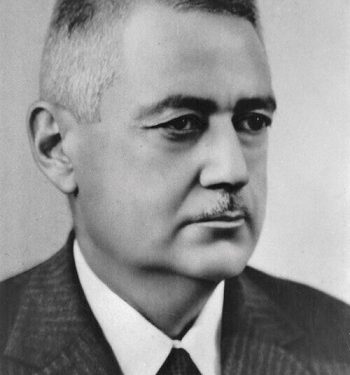
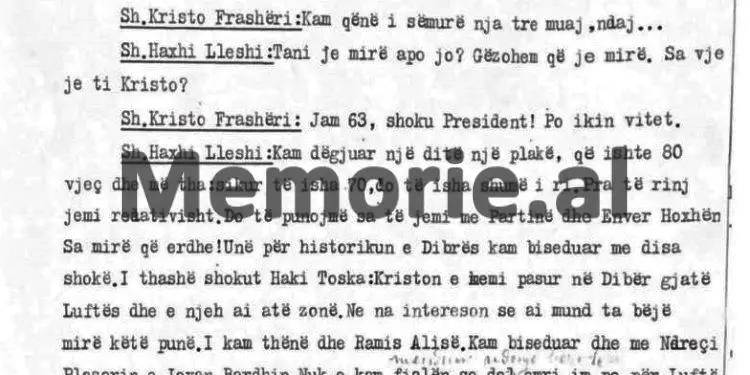
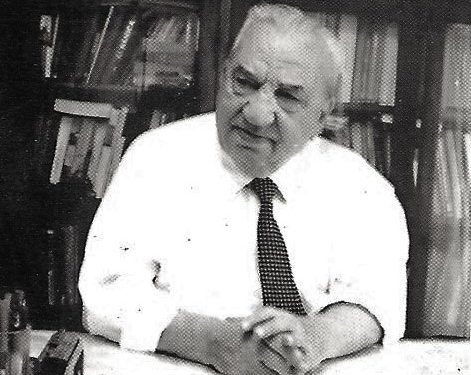
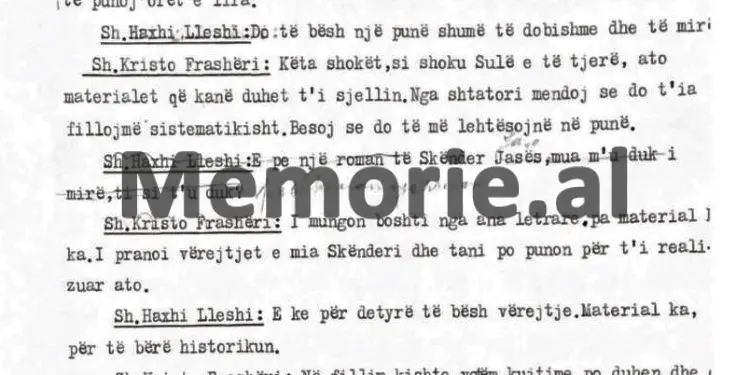
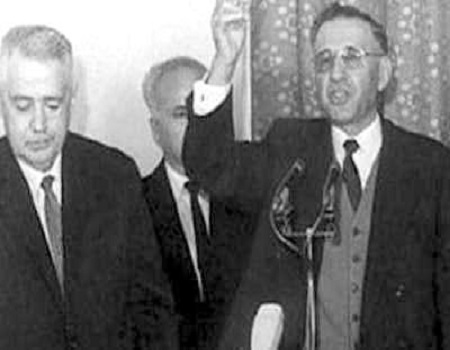
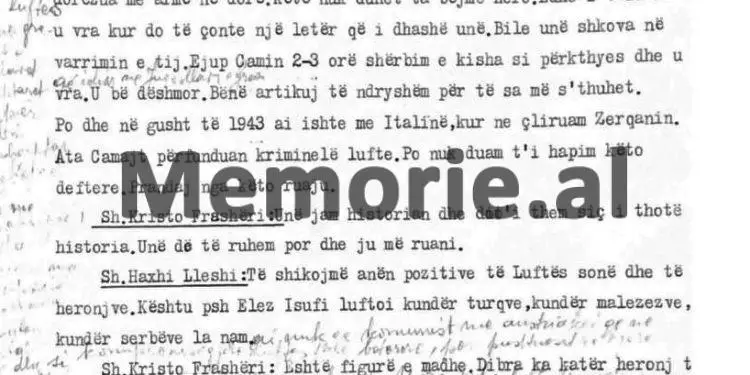
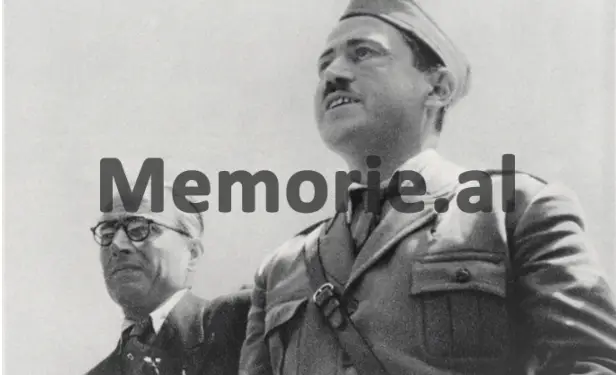
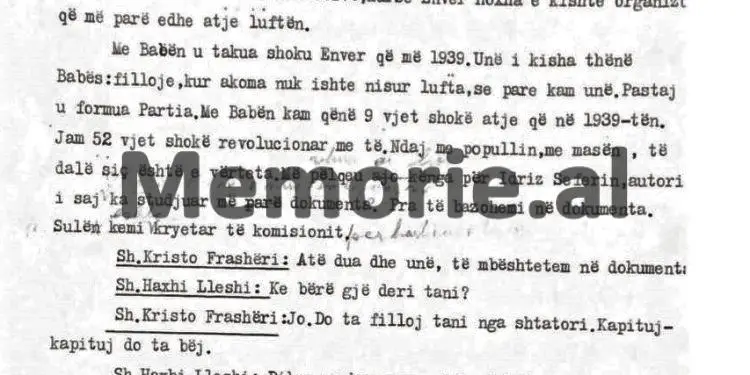
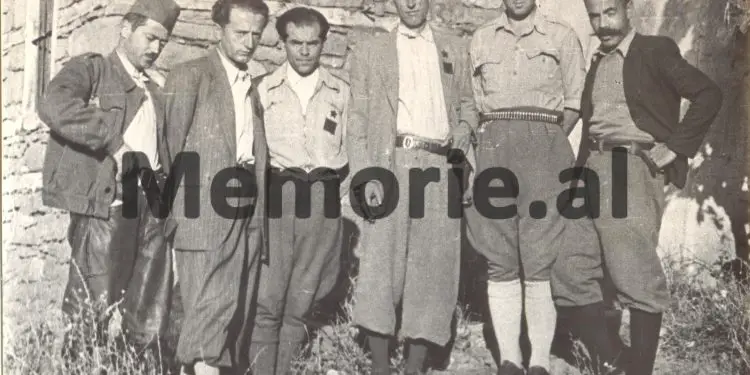
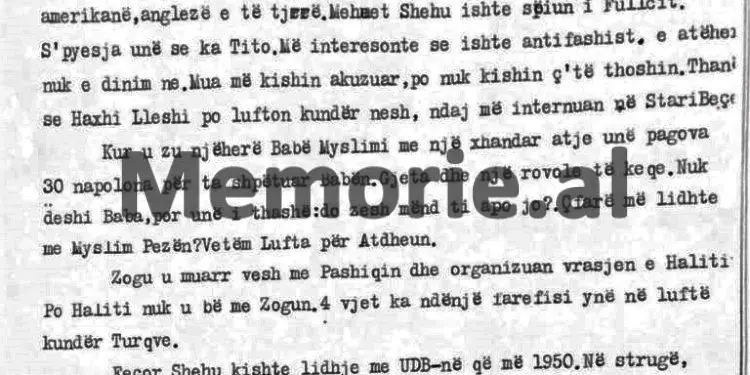
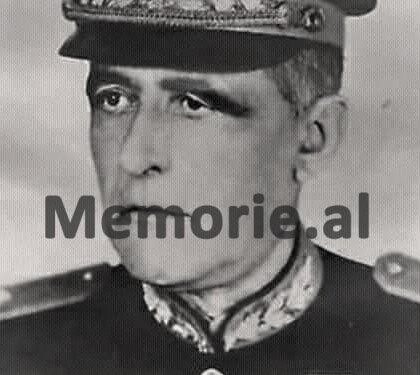
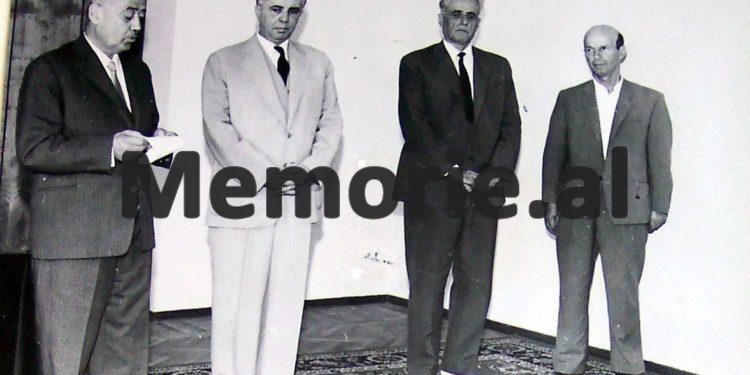
![“In an attempt to rescue one another, 10 workers were poisoned, but besides the brigadier, [another] 6 also died…”/ The secret document of June 11, 1979, is revealed, regarding the deaths of 6 employees at the Metallurgy Plant.](https://memorie.al/wp-content/uploads/2026/02/maxresdefault-350x250.jpg)





